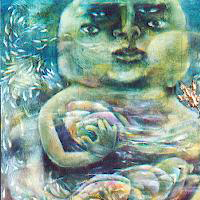Prosperity & Immortality
Happiness is actually a combination of two things. The first component is the feeling that whatever you want is within your reach. The second component is the ability to digest a thing when you have it. Happiness is a state when the feeling of deprivation is totally absent.
 Universe As little children you would have read a lot of fairly tales. Many of these tales end happily with the simple statement “And they lived happily forever”. These are the fundamental wishes which we nurture within us as we grow up. We want to live happily. And we want to live forever.
Universe As little children you would have read a lot of fairly tales. Many of these tales end happily with the simple statement “And they lived happily forever”. These are the fundamental wishes which we nurture within us as we grow up. We want to live happily. And we want to live forever.
What does happiness mean? Is it a state where all wishes have been fulfilled? Yes, to some extent. But it is only a transient happiness. Because when a wish is fulfilled its potential to give you happiness is extinguished. A tasty pizza is an object that can give you happiness till it disappears down through your throat. The unhappiness of not having the pizza was removed by going through the process of getting it and eating it. Now the pizza that has disappeared into your stomach could be an agent of unhappiness if it doesn’t agree with your system and you cannot digest it. Happiness is actually a combination of two things. The first component is the feeling that whatever you want is within your reach. The second component is the ability to digest a thing when you have it. Happiness is a state when the feeling of deprivation is totally absent. In that state you don’t feel deprived of dreams. You don’t feel deprived of the means for achieving your dreams. You don’t feel deprived of the power to digest the things you ingest in that process. Putting it in a different way, happiness is being resourceful being prosperous.
Now if we wrongly imagine that happiness comes from the grabbing of all the things we want we are opening the door to unhappiness. Gluttony can never bring you happiness. It can only provide a flabbiness that adversely affects your agility and create a permanent feeling of dissatisfaction that, in effect, intensifies your feeling of deprivation. When you are grabbing something here, you are also being grabbed by the fear of death. Fear of deprivation is the rope by which death marshals you to him. This is beautifully expressed in a verse in Kathopanishad.
Parachah kamananuyanti balaste mrutyor yanti vitatasya pasam
Atha dhira amrutatvam viditva dhruvamadhruveshviha na prarthayante
(Verse 2 � II Chapter – Kathopanishad)
- Those who pursue worldly pleasures are immature. They get entangled in the rope thrown by the lord of death. The intelligent people who understand immortality do not search for it among things that are not permanent.
So being resourceful is the important thing, and not grabbing things to possess them. Resourcefulness is the ability to cope with anything spontaneously with the minimal increase in entropy – the degree of disorder. This high degree of productivity is what connects this world and the higher world what connects your lower self with your higher self. This union is what we call Yoga. In Bhagavad Gita, Sri Krishna tells to Arjuna:
Budhiyukto jahateeha ubhe sukrutadushkrute
Tasmat yogaya yujyasva yogah karmasu kausalam
(Verse 50 � Chapter II � Bhaagavat Gita)
- The intelligent ones give up here the bonds of good and bad deeds. Therefore devote yourself to this Yoga. Yoga is the cleverness to perform actions well.
This resourcefulness comes from the thorough knowledge of everything concerned with this world and mastering the techniques of applying that knowledge. That is the relevance of the studies of the worldly subjects. This resourcefulness gives you the structural integrity and dynamic balance that permits you to commit a substantial part of your energy for higher pursuits.
While immortality is something that transcends this world, the fear of death is very much a worldly phenomena. It is lurking in the fear of deprivation that we feel in varying degrees on different occasions. Fear of death as an end of life is only the same phenomenon in its extreme form. The attempt to gain immortality should be accompanied by efforts to overcome the fear of death. This is clearly brought out in the Isavasya Upanishad.
Vidyam cha avidyam cha yastad vedobhayam saha
Avidyaya mrutyum tirtva vidyaya amrutamashnute
(Verse 11 � Isopanishad)
- Vidya and avidya should be grasped together. One overcomes death through avidya and attains immortality through vidya.
Here vidya is brahmavidya that leads you to the ultimate truth. As worldly things obscure the ultimate truth, the knowledge related to the things of the world is called avidya.
So you should learn about the world where you live in as much as possible. Darkness produces fear. We do not know what is hiding in the darkness ready to attack us. When the light of knowledge removes the darkness there will be nothing in this world that can frighten you. You will know exactly how you should be responding to each and every situation. With this liberation from fear, you are free to set your sights higher.
What is the higher pursuit? Once you have mastered an abundance of resources in the physical, emotional and intellectual planes you have freed yourself from any feeling of deprivation from the fear of death from the ropes of Yama. You have to be above the manipulations of death if you want to progress beyond this world. When that is done you are ready to take on the next challenge. That is, the issue of immortality.
How can you ever aspire to be immortal? It is a law of nature that whatever is born is bound to die. So to escape death you should also give up birth. You ought to become someone who is never born if you want to be someone who is never going to die. You ought to get away from this worldly plane altogether.
By cultivating yourself to be resourceful you have made yourself a seaworthy boat. But this boat while remaining in the open seas is always swaying with the waves of the sea. Your resourcefulness helps to take care of all events effortlessly. But each one of your actions attracts more actions and the boat keeps swaying too and fro dangerously. That is what happens to a boat when its engine is switched off. These swaying motions are what keep you pinned to the worldly plane. Resourcefulness by itself is not a ticket for going upwards. With all the resources Arjuna felt confused. Sri Krishna had to coax him out of his depression to move on the path of spiritual progress.
If you want to get off from the worldly plane you must develop a thrust to propel you away from this plane. Then in comparison to that thrust the disturbances that used to rock you so much will lose their significance. The new pattern of movement set by this thrust will make it more and more difficult for the disturbances to affect you. Just as a speedboat gliding over the waves remains unaffected by the waves you will sail smoothly under the power of this thrust.
Before switching on the engine and allowing the thrust of the engine to take over you have to have a clear idea about the destination for the journey. Otherwise the smooth sailing could lead you to even bigger troubles. What could be the destination and what should be the path that we should traverse? The answer to this question appears in the Narayana Upanishad.
Vedahametam purusham manantam
Adityavarnam tamasah parastat Tameva vidvanamrutatvamiha bhavati
Nanyah pantha vidyate ayanaya
(Verse 12 � I Anuvaka � Narayana Upanishad)
- I know this purusha as greater than all that is great. It has the brilliance of the sun and is darker than the deepest of darkness. By knowing this one tastes the nectar of immortality here itself. I don’t know of any other path that is worthy of being pursued.
This ideal lies outside the worldly plane. It is capable of giving anything and is totally independent of everything that we can conceive of. It is greater than the greatest. In brilliance it excels the sun. It can empower everything in this universe. In darkness it is beyond the darkest dark hole. Here darkness is the state when there is no energy. This dark blackhole can provide everything in this universe with relevance. It attracts everything to it. So this purusha has the power to energize others as well as the power to absorb the energies of others. In this purusha the synthesis of all dualities of the world takes place. Identification with this purusha is the only path that is worthy of being pursued. Anything dedicated to this purusha comes back to you sustaining a stream of energy that never comes to an end. By keeping in touch with this ideal you experience immortality.
We experience reflections of this in the worldly plane too. You maintain a commanding position, not by taking sides with any of the persons working under you, but by resolving the conflicts arising between them by applying a higher wisdom. A duality is a potential conflict. Your ability to resolve dualities at higher and higher levels determines how far you can make it to a truly commanding position. How much of an organization you can hold together with integrity? That is the question being asked again and again. When you have acquired the potential to resolve all the conflicts in the worldly plane by your resourcefulness you are now poised to resolve the conflict between the worldly plane and the plane transcending this world bounded by space and time. So the purusha gives you the ideal for setting your path for application of the thrust.
Having defined the direction let us inquire about the nature of the thrust? The thrust is the upward aspiration that propels you to the ideal. This upward aspiration is udgeetham.
Udgeethametatparamamtubrahma Tasmimstrayam supratishthaksharam cha
Atrantaram brahmavido viditvam Lina brahmani tatpara yonimukta
(Verse 7 � Chapter I � Svetasvetara Upanishad)
- This udgeetham itself is having the nature of brahma. It is established in the three aspects related to the worldly plane as well as the immutable aspect related to the transcendental plane. By recognizing well the differences between these, the brahmavit remain immersed in brahma. Thus they become free of rebirth. They live in the eternal present.
We experience three categories of aspirations in the worldly plane. The first is the aspiration for pursuing our own expansiveness. We expand by increasing our accumulations. So this is the aspiration to accumulate. If we take this aspiration too far, we end up as a miser. The second is the aspiration for creating a good degree of movements in this world on our own. It is the aspiration to keep moving. Taken to the limits it can create unproductive agitations that overwhelm everything else. The third is the aspiration to know about everything. It is the aspiration to enrich awareness. Taken to the extreme it may lead to a dreamy existence that has not much connection to the real world. The presence of these three aspirations in a balanced manner results in a harmonious existence in this world. And in that harmonious state you are now ready to soar to the plane transcending this world. Now that plane is without beginning, end or mutation. So the aspiration connecting you to that plane is also without beginning, end or mutation.
All these aspirations have their place in your life. Only when they are taken together they can hold you together and lead you up. If you give up any one of them you lose the possibility to get liberated as an intelligent being. If you neglect your aspiration to accumulate without satisfying your needs you will be forced to depend on others. That dependency will cramp your abilities to dream and move. Instead of being a generous person it is more likely that you may end up as an unhappy person nursing one’s own regrets. Similarly, neglecting the other aspirations in the worldly plane also have their own ill effects. An enlightened person knows the difference between these aspirations and knows how to give each one of them their rightful place in one’s life.
He remains immersed in the flux created by these four aspirations. He remains immersed in brahma becoming one with it. He transcends all desires and any propensity to participate in the process of creation. He lives in the eternal present without regrets about the past and worries about the future.
Sa vedai tatparam brahma dhama Yatra visvam nihitam bhati subhram
Upasate purusham yehyakama Te sukrametadativartanti dhira
(Verse 1 � Mundaka 3 � Chapter 2 � Mundaka Upanishad)
- Knowing that transcendental abode of brahma where the entire universe remain hidden, and from where it is projected in a pure form, and worshipping the purusha giving up all desires, the intelligent persons transcend the seed of all creations.
Even while remaining in this world positioned by his aspirations he is constantly aware of the transcendental source from where this universe bound by time and space is projected, and where it perpetually resides. He knows it with all his being. And identified with the immortal brahma he too attains immortality.
Spirituality is not an escape route from life. You cannot run away from life and make spiritual progress. It is the fullness of life that overflows as spiritual progress. Fearlessness is the foundation for spiritual progress. This fearlessness is to be acquired by mastering worldly knowledge. Then, on this foundation, you can build your efforts for the attainment of immortality. Both these pursuits should proceed together. Avidya should be there for fearlessness that makes spiritual progress possible. Vidya should keep the application of worldly knowledge on track to ensure that worldly pursuits do not create stumbling blocks in the path of spiritual progress by shrouding the path for the journey beyond this world.
World is for the living people. Both the conquest of death and immortality are to be attained while living in this world itself. So make the full use of your lifespan by keeping your ears open for the voices of spirituality emanating from all the manifestations of divinity around you right from the early stages of your life.
























